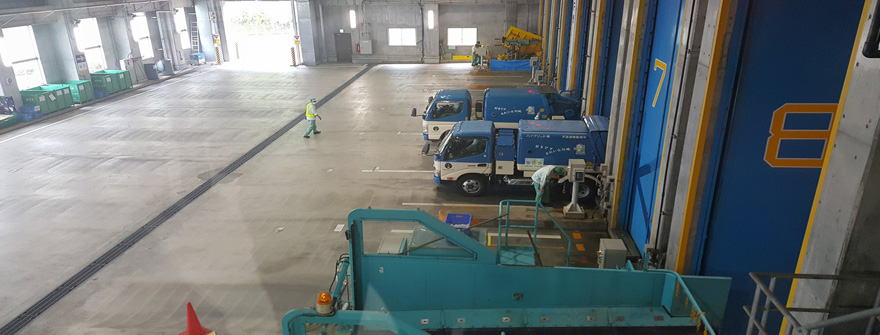Fellows' Works & Activities
Colliding Worlds
The world is a small place. Once upon a time this sentence used to have a different meaning with different implications. However, in contemporary times, with globalization and better communication technology, the world has truly become a smaller place. Each of us lives in a world with some parts of it shared with some people, while other parts of our world are shared with others. Yet, every now and then, we find these different parts of our world coming together. I have just experienced such a collision of two worlds.
More than a decade ago, while a director at the Maldives Ports Authority, I was most fortunate to become a Sasakawa Fellow and achieve my MSc qualification at WMU. Though my specialization was Port Management, environmental issues were already well integrated in the academic content as well as in some regulations. In many countries around the world legislation was either being drafted or already enforced regarding the protection of the environment. MARPOL had been astutely tuned in to serve this purpose. In short, the environment was already important.
As the years progressed, my career diverged from a maritime environment at the port to a policy environment in the government. Currently, one of my responsibilities is being a member of the board of directors at the state owned Waste Management Corporation (WaMCo) of Maldives. The management of waste in the country is at an infant stage. Already the capital city of Malé is producing waste that is beyond the capacity of the processing facilities currently available, and new methods are being sought. However, any new technology introduced must adhere to strict environmental regulations and guidelines already enacted.
It is in this role that I was fortunate again to visit Japan in July 2016, nearly twelve years after my first trip there as a Sasakawa Fellow. The main purpose was to study Japan’s waste handling technology and its impact on the environment, and to see if anything could be applicable to Maldives. Japan handles waste in a remarkably efficient way, utilizing a 3R concept: Reduce, Reuse, Recycle. As it happens, Maldives also initiated the 3R concept in 2015.
During this visit, I was honoured to meet with Mr. Kudo and Mr. Ichikawa of the Sasakawa Peace Foundation, and then later joined by a WMU colleague of my senior year, Ms. Yakabe, for dinner. The evening was a most memorable one; in recent years, I honestly cannot recall enjoying an evening more. I remember thinking how wonderful it felt to find friends from the past while on a trip that came about from such a different area. The world is truly a small place.
However, whether we are involved in the maritime field or waste management policy, environmental issues are so similar and so real. Regulation alone won’t suffice. Everyone’s attitude towards protecting the environment is just as important today as it was twelve years ago.
Ahmed Shihan
Malvives, 2005
More than a decade ago, while a director at the Maldives Ports Authority, I was most fortunate to become a Sasakawa Fellow and achieve my MSc qualification at WMU. Though my specialization was Port Management, environmental issues were already well integrated in the academic content as well as in some regulations. In many countries around the world legislation was either being drafted or already enforced regarding the protection of the environment. MARPOL had been astutely tuned in to serve this purpose. In short, the environment was already important.
As the years progressed, my career diverged from a maritime environment at the port to a policy environment in the government. Currently, one of my responsibilities is being a member of the board of directors at the state owned Waste Management Corporation (WaMCo) of Maldives. The management of waste in the country is at an infant stage. Already the capital city of Malé is producing waste that is beyond the capacity of the processing facilities currently available, and new methods are being sought. However, any new technology introduced must adhere to strict environmental regulations and guidelines already enacted.
It is in this role that I was fortunate again to visit Japan in July 2016, nearly twelve years after my first trip there as a Sasakawa Fellow. The main purpose was to study Japan’s waste handling technology and its impact on the environment, and to see if anything could be applicable to Maldives. Japan handles waste in a remarkably efficient way, utilizing a 3R concept: Reduce, Reuse, Recycle. As it happens, Maldives also initiated the 3R concept in 2015.
During this visit, I was honoured to meet with Mr. Kudo and Mr. Ichikawa of the Sasakawa Peace Foundation, and then later joined by a WMU colleague of my senior year, Ms. Yakabe, for dinner. The evening was a most memorable one; in recent years, I honestly cannot recall enjoying an evening more. I remember thinking how wonderful it felt to find friends from the past while on a trip that came about from such a different area. The world is truly a small place.
However, whether we are involved in the maritime field or waste management policy, environmental issues are so similar and so real. Regulation alone won’t suffice. Everyone’s attitude towards protecting the environment is just as important today as it was twelve years ago.
Ahmed Shihan
Malvives, 2005
